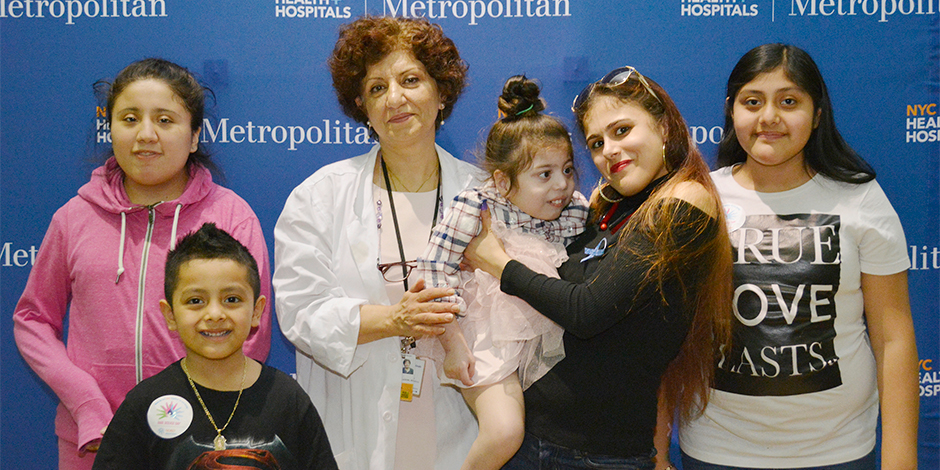NYC Health + Hospitals/Metropolitan Commemorates Rare Disease Day, February 28
NYC Health + Hospitals/Metropolitan Hosts a Series of Events to Raise Awareness about Rare Diseases and Their Impact on Patients' Lives
Feb 28, 2018

NYC Health + Hospitals/Metropolitan commemorated international Rare Disease Day today with a series of events hosted by the hospital’s Genetics Division. Since 2008, Rare Disease Day has been held on the last day in February to raise awareness about rare diseases and their impact on patients’ lives. Events are organized locally around the world, with events taking place in over 90 countries.
“Rare diseases, also known as orphan diseases, affect a small percentage of the population, but the individual needs of patients are great,” said Alina Moran, chief executive officer at NYC Health + Hospitals/Metropolitan. “Rare Disease Day provides an opportunity for patients and their families to come together with clinicians and researchers. They support each other by sharing information and stories about their common struggles, and provide necessary education and inspiration to others.”
A short program featured presentations and personal testimonials from patients, families, and Genetics Division staff, followed by a celebration for patients. The hospital also hosted an exhibition of photographs from the Positive Exposure: The Spirit of Difference project celebrating the diversity of children and adults with genetic conditions. The event also included a resource fair with representatives from a number of patient advocacy groups and educational organizations, including the National Organization for Rare Diseases, Facing Our Risk of Cancer Empowered (FORCE), Prader-Willi Syndrome USA, the Angelman Syndrome Foundation, Gigi’s Playhouse Down Syndrome Achievement Center, and others.
“When my daughter was born, everything seemed fine, but as she got older I noticed something was different about her development,” said Mahmuda Sultana, mother of Chowdhury Mayeesha, 11, a patient at NYC Health + Hospitals/Metropolitan. “We went to many doctors and specialists in Bangladesh, but none of them could find anything. By the time she was 6, we were told she had autism and epilepsy, but there was no treatment. It was not until we came to Metropolitan in 2015 that she was diagnosed with BPAN, a rare genetic disease.”
BPAN, or beta-propeller protein-associated neurodegeneration, is a progressive disorder that damages the nervous system. Children with BPAN have intellectual disability, delayed development, including significant problems with vocabulary and producing speech, and difficulty coordinating movements. Almost all cases of BPAN result from new mutations in one specific gene and occur in people with no history of the disorder in their family. About 100 cases have been described in the medical literature.
“It is all a bit frustrating and stressful because there is no treatment and no cure, but as a parent, I remain hopeful,” added Ms. Sultana. “The Genetics staff at Metropolitan, and especially Dr. Banikazemi, have been very helpful, always explaining information to me and answering my questions.”
“In our annual Rare Disease Day program, one of our goals is to educate health care professionals across all disciplines about the state of rare diseases and the unmet needs in this area,” said Maryam Banikazemi, MD, section chief of the Genetics Division at NYC Health + Hospitals/Metropolitan. “We also intend to uplift the spirit of our patients and their families, to support them seeing their differences, and to help them to recognize their power.”
Dr. Banikazemi is a physician-scientist in the field of clinical, medical, and biochemical genetics at NYC Health + Hospitals/Metropolitan and New York Medical College. She is one of the world’s foremost experts on Fabry disease and other lysosomal storage disorders, a group of more than 40 rare genetic diseases that lead to the accumulation of harmful waste products in the lysosomes of cells, ultimately disrupting cell function. She has participated extensively in patient-oriented clinical research and development of new drugs and therapies for lysosomal storage disorders.
The Genetics Division, part of the Pediatrics Department at NYC Health + Hospitals/Metropolitan, provides a range of services, including genetic counseling, diagnosis, and treatment for over 400 patients and families. The clinic provides services to patients of all ages, from prenatal cases to advanced-age adults, with genetic conditions—rare and not so rare—including chromosomal abnormalities, single gene disorders, Alzheimer’s, and a variety of cancers.
For more information about the Genetics Division, please contact 212-423-6452.